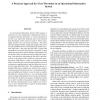264 search results - page 40 / 53 » Bounding the number of tolerable faults in majority-based sy... |
119
click to vote
ICDCS
2002
IEEE
15 years 6 months ago
2002
IEEE
An Operational Information System (OIS) supports a real-time view of an organization’s information critical to its logistical business operations. A central component of an OIS ...
106
Voted
CLUSTER
2001
IEEE
15 years 5 months ago
2001
IEEE
Using multiple independent networks (also known as rails) is an emerging technique to overcome bandwidth limitations and enhance fault tolerance of current high-performance parall...
WDAG
2009
Springer
15 years 8 months ago
2009
Springer
Abstract. Wireless ad-hoc networks are being increasingly used in diverse contexts, ranging from casual meetings to disaster recovery operations. A promising approach is to model t...
122
Voted
SPAA
2010
ACM
15 years 6 months ago
2010
ACM
In this work, we address Byzantine agreement in a message passing system with homonyms, i.e. a system with a number l of authenticated identities that is independent of the total ...
141
click to vote
IEEEHPCS
2010
14 years 11 months ago
2010
In grid computing systems, providing fault-tolerance is required for both scientific computation and file-sharing to increase their reliability. In previous works, several mechani...

